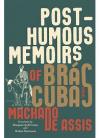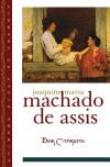Joaquim Maria Machado de Assis is widely considered Brazil’s Shakespeare. The critic Harold Bloom included him on his list of the 100 greatest literary geniuses – alongside Dante, Cervantes and, of course, the Sweet Swan of Avon.
Through innovative novels, poems, short stories and plays, the 19th century writer (1839-1908) spun compelling tales that pierced the veil between the imagination and objective reality. Some critics have described his work as Romantic Realism.
De Assiss’s father was the son of a freed African slave; his mother was a Portuguese washerwoman. Like Shakespeare, de Assis received little formal schooling; not being taught the rules may have freed him. Poor, short, sickly (he suffered from epilepsy) and a stutterer, his origins were inauspicious. But he was also brilliant and likable, and befriended people who lent him books and taught him languages.
 His breakthrough came in 1881 with publication of The Posthumous Memoirs of Brás Cubas, whose eponymous dead narrator—he dedicated the book to the first worms who dine on his body—daringly and cynically chronicles his own life in 160 brief, disconnected chapters. Writing about the novel in the New York Times, K. David Jackson observed:
His breakthrough came in 1881 with publication of The Posthumous Memoirs of Brás Cubas, whose eponymous dead narrator—he dedicated the book to the first worms who dine on his body—daringly and cynically chronicles his own life in 160 brief, disconnected chapters. Writing about the novel in the New York Times, K. David Jackson observed:
Although Machado takes on issues common to realists of his day -- adultery, hypocrisy, egotism—he rejects both social determinism and descriptive prose. He does not seek to denounce or reform society, but by using dry humor creates brilliant scenarios in the tradition of Menippean satire—as Enylton de Sa Rego points out in the preface to this edition. As a deceased philosopher, Bras has a madness to his method. His odd theories codify self-analysis through comedy: he dreams of becoming wealthy by inventing a poultice for melancholy; he applies his ''Law of the equivalency of windows'' to explain life's sudden changes; and he expounds a ''theory of human editions'' that compares the stages of life to editing and printing a book.
When Oxford University Press launched its Library of Latin America in 1998, “Bras Cubas” was one of the first two books it published; the other was the work considered Machado’s masterpiece, Dom Casmurro.
 That novel also impressed Michael Griffith, whose new work of nonfiction, The Speaking Stone: Stories Cemeteries Tell, also pierces a few veils. Michael holds Dom Casmurro in such high esteem that he contributed this smart appreciation to Top Ten Land so that more readers could discover this great writer.
That novel also impressed Michael Griffith, whose new work of nonfiction, The Speaking Stone: Stories Cemeteries Tell, also pierces a few veils. Michael holds Dom Casmurro in such high esteem that he contributed this smart appreciation to Top Ten Land so that more readers could discover this great writer.
Appreciation of Joaquim Maria Machado de Assis’s Dom Casmurro by Michael Griffith
In 1878, nearing forty and afflicted by epilepsy and rickets, Machado, a successful but conventional Brazilian romancier, withdrew from Rio to convalesce. He returned not only rejuvenated but transformed; in coming decades he would write, among other works, three classic novels: Posthumous Memoirs of Brás Cubas, Philosopher or Dog?, and Dom Casmurro.
 Dom Casmurro (“Lord Taciturn”) is Bento Santiago, an affluent old man undone by jealousy. He believes that his wife, Capitu, betrayed him; his friend Escobar must be the real sire of Bento’s son. Yet what’s most remarkable here is not the story but the storytelling. There’s its fragmented form (148 chapters in scarcely 250 pages); there’s Machado’s mixture of scathing satire with empathy for his narrator, whose autobiography is part legal brief, part cri de coeur, part special pleading, even (covertly, poignantly) part mea culpa. But Machado’s signal feat is his pioneering handling of unreliable narration.
Dom Casmurro (“Lord Taciturn”) is Bento Santiago, an affluent old man undone by jealousy. He believes that his wife, Capitu, betrayed him; his friend Escobar must be the real sire of Bento’s son. Yet what’s most remarkable here is not the story but the storytelling. There’s its fragmented form (148 chapters in scarcely 250 pages); there’s Machado’s mixture of scathing satire with empathy for his narrator, whose autobiography is part legal brief, part cri de coeur, part special pleading, even (covertly, poignantly) part mea culpa. But Machado’s signal feat is his pioneering handling of unreliable narration.
Though Bento prosecutes his case zealously, his evidence boils down to the oft-repeated fact that Capitu has “eyes like the tide.” Bento may be deluded, even reprehensible, but we are not allowed to laugh at him, to think ourselves superior. He’s like us. And if every narrator is subject to similar blindness and self-pity, how to trust anyone? The question would loom large in twentieth-century literature.
The reader, too, is implicated. Bento writes, “[E]verything is to be found outside a book that has gaps, gentle reader. This is the way I fill in other men’s lacunae; in the same way you may fill in mine.” Reader, jury, do with me what you will. Machado admits into his text radical postmodern ambiguity, years before its heyday, for what book does not have gaps, is not made up of gaps?
Allusive, psychologically penetrating, politically charged, darkly funny, Dom Casmurro links Sterne to Barthelme, Flaubert to Nabokov, and remains startlingly fresh.